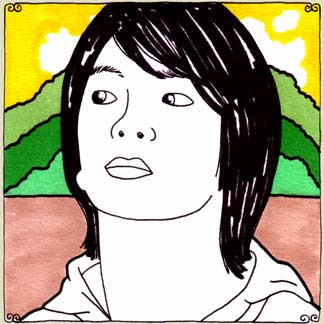- Welcome to Daytrotter
- Typewriter
- Rain
- A Kite of Night
- Wedding
- Sanganichi
Once things start turning here in the Midwest, it all dries pretty quickly. There’s never much pacing involved. Before anyone knows it, the beeswax from the ripened and husked ears of corn is flying through the air like an attack of harmless yellow jackets and pink snow flurries. Pumpkins are obese and everything smells like firewood and marshmallows. Shugo Tokumaru doesn’t get to experience these phenomenon living and making art where he does in Japan, but perhaps there’s been some reincarnation work done on the young man that no one knows about that makes him act the way that he does when he’s writing and playing his music.
There’s a purity of life, a natural progression of seasonal change, of growth and light and dark and chippy buoyancy that laves its smacks on his adventuresome pop songs. They are full of gold dust and energy and helium, pulling them up from the surface and giving them the power of motion. They get around and they shake and they chime. Tokumaru is an expert at making moods from bare bones, shaping triumphant lushes that feel as if they were overlaid upon one another, making a spectacular three-dimensional film that can reach right out and not only feel the warmth in your cheeks, but can help put some of the stuff in those cheeks.
Both acts are impressive, anyone would agree. It’s a special relationship that he has with his guitar and the things that he can make it do are akin to getting the first airplane off the ground and into the air and while up there getting a first kiss and immediately proposing marriage. It’s somewhat breathtaking and staggering when Tokumaru gets going with his light vocals, the bells, the deep thrushes of strums that stir up a wooly buffalo-ish cloud of outburst and then takes us somewhere completely foreign and yet comfortable. It’s almost as if we’re taken to some far-off world that we’d forgotten about decades ago, some fuzzily remembered place that we visited with our parents when we were first learning how to read, when we’d never been anywhere before.
Tokumaru’s songs are filled with what can only be described as a child-like wonder, where the littlest things capture us up and become bigger things. It’s like when we were freaks for dinosaurs or when we first started noticing beauty – the shine of hair, the perfect dimples in a girl’s face, the flapping wings of a bird leaving the ground, the sound of our singing voice when it’s allowed to just let go and warble. It brings us back to the original idea of things just taking their natural time with everything, with fitting into the laidback meandering of autumn into the kind of friendly postseason where we all just dress a little thicker and sip the air in. It goes down smoothly. Randomly in Tokumaru’s songs does an English word pop into the proceedings and it’s like a revelation of sorts. On “Parachute,” it almost sounds as if he’s singing, “Bless you,” and everything takes on a different meaning.
It’s interesting to go down those paths with all of the songs on Exit, his superb third album and his major American introduction. It’s like a heart dividing and sending what it has into a couple different directions, hanging onto the remainder. “Wedding” is where Tokumaru prominently displays some of the robust magic that he can summon out of his guitar and some willingness to follow him into the dark. It’s the album closer and damn if it doesn’t feel like a wedding, whatever that means. It feels like bouquets multiplying and it feels like an event and a buffet. The 28-year-old is properly versed in making things feel as if they’ve been tenderly cared for. He lovingly measures out what he feels the recipe calls for, watches the rising of the cakes, stands in front of the hot oven checking on the progress of them, never taking his eyes off of them and believing that they’re fine of their own. These songs are seen through to completion and only at that point does Tokumaru hold them out for others to behold.
